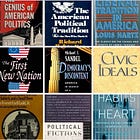

There is a persistent illusion—beloved by both the radical left and the postliberal right—that the American tradition begins with John Locke. That America was born in the Enlightenment, matured in abstraction, and is now dying of the same. That we built a system on autonomy and proceduralism, and we are finally witnessing the end of its hollow moral frame.
But the truth is far stranger than that, and more difficult to escape. Locke did not create the American tradition. He arrived late to explain it.
Locke was the rationalization—useful, eloquent, eventually canonized verbatim into our national creed—but not the root. We became Lockeans in the way one becomes fluent in a language: slowly, unconsciously, and mostly by necessity. We needed a grammar to explain what we had already built. And what we had built did not come from theory. It came from the Puritans; from covenants forged in winter, and from dissenting traditions so morally demanding they could produce both the First Great Awakening and the abolitionist movement.
The Puritan legacy is so embedded in the American psyche that even our most strident critics still think in its vocabulary. You can’t crispr it out of our ideological DNA. Even the secular left, even the professors who mock religion as superstition, still enforce their moral disciplines with the zeal of a Jonathan Edwards. What they call critical theory would be unrecognizable without the moral architecture of sin, confession, and excommunication. The chair of feminist studies at Harvard is more theologically stringent than the average resident of Salem in 1692—only the doctrine has changed.
We are not liberal in the European sense. We were never meant to be. European liberalism was a product of secularization, born of revolutions that had to overthrow throne and altar to build a society. American liberalism was never that. It was born in the inverse: a society already formed by religious seriousness, already practicing limited government, already suspicious of power, already steeped in moral accountability—not to the state, but to conscience. Our experiment was not what happens when liberty defeats faith. It was what happens when liberty is sustained by faith.
This is where the postliberal right so often misfires. They are not totally wrong in their diagnosis—liberalism is under threat because it no longer forms people capable of sustaining it. But their prescription misunderstands the patient. They imagine that America was always hollow, that Locke was the poison, that procedural restraint and individual rights were cover for a deeper disorder. They say the state must now do what the churches and families no longer can: impose virtue, define the good, recover order by authority.
What Deneen and Vermeule offer under the banner of restoration—whether through common good constitutionalism or Catholic integralism—is not a recovery of the American tradition, but its repudiation. It is a theocracy draped in the symbols of a republic they reject, dressed in the language of a Constitution they no longer believe in.
As noble as Catholicism is, the idea that a universal church can find political purchase in the very nation that invented religious pluralism is, frankly, absurd. America did not disestablish religion because it was indifferent to the sacred—it disestablished religion because it was already religious, and because it believed the only true faith was that which could persuade without coercion. Our tradition is one of covenantal multiplicity, not ecclesial uniformity. Protestant dissent built the moral architecture that allowed pluralism to flourish—not despite our theology, but because of it. That moral infrastructure is now collapsing. But it will not be restored by state power or church hierarchy. It will only be restored the way it was built: from the bottom up, through families, voluntary associations, and moral imagination that can still speak in the public square without demanding to rule it.
Republicanism in the American model was never theocracy. It was never moral authoritarianism. It was a delicate structure of liberty and limits—designed not to command virtue but to make space for it. The system did not presume the state would form the citizen. It presumed the citizen would be formed elsewhere. And for most of our history, they were.
Religion did that work. Not because it was established by law, but because it was established in the culture. That’s why it’s so hard to replace. Not because America was a Christian nation in any legal sense, but because it was a free nation that depended on moral formation from below. And when that moral ecology began to collapse—when the family weakened, when the churches emptied, when virtue became performance instead of practice, when it chose politics as a means to save souls—the republic lost something no procedural mechanism could repair.
So yes, the post-liberals are right to say something is dying. But what’s dying is not Lockeanism. What’s dying is the cultural soil in which Lockeanism could plausibly function. And the answer is not a Catholic confessional state. It is not a Protestant nationalism in drag. It is not a new constitutional order dressed in the language of “common good.”
It lies in the rebuilding of conscience—the recovery of moral institutions that shape character without state enforcement. It requires the slow, voluntary resurrection of formation in families, congregations, and communities. And it demands the humility to recognize that none of this can be coerced.
It also requires the wisdom to see that this work matters just as much when it’s carried out in a progressive Unitarian church in Boston as when it’s carried out in a Pentecostal congregation in West Texas, a Quaker meeting house in Pennsylvania, or a synagogue on the Upper West Side. What matters is not uniform belief, but a shared commitment to moral formation—the quiet, often thankless work of shaping people who can live in freedom without having to be ruled. And in this pluralist ethic of moral seriousness, we still honor the legacy of the Puritans—not by preserving their doctrines, but by carrying forward their deeper gift: a tradition of principled dissent, of communal responsibility, and of grappling openly with the most contentious religious, social and civic questions without tearing the body politic apart.
Perhaps it begins by remembering that our highest obligation as citizens is not to a political party or a celebrity politician, but to the institutions and communities right in front of us—the ones still capable of forming free people, if we are willing to tend to them. Whatever your faith, or your doubts, we are all stewards of a shared inheritance: the American Ideology itself. America is not a brand or a battlefield. It is a project—a covenant across generations, a republic that depends not on power but on character. And the American Ideology reminds us that this character cannot be legislated from above—it must be cultivated from below. It will not be saved by outrage or rhetoric or demagogues. It will be restored by those willing to rebuild what holds us together: family, community, conscience, and the quiet work of forming citizens. That is the work. And it is ours to do.
Locke, for all his limits, understood one thing better than his modern critics. Liberty without formation will destroy itself. But formation without liberty is not worth having.
What is the American Ideology? America Ideologue is a new Substack series that examines that question and introduces a bold and timely thesis: that America is, and has always been, defined by a coherent—if often unspoken—ideology. Most nations are bound by land, blood, or tradition. But as G.K. Chesterton observed, America is “the only nation...founded on a creed.”
This series explores how that creed was not merely an aspirational abstraction, but a working ideology deliberately enacted through constitutional design, civic institutions, and cultural norms. The analytic framework I developed as part of an unfinished doctoral dissertation aborted thirty years ago provides a way to define and possibly restore the American Ideology as a true ideology.
The question at the heart of the series is both urgent and enduring: Can the ideology that once bound us together still hold?
- TABLE OF CONTENTS -
1. Welcome to American Ideologue
2. The Dying Ideology
3. The Science of Ideas: Defining Ideology
4. In Search of the American Ideology
5. A Framework for the American Ideology
6A. The First American Synthesis













Very good article.
The Left has been ignoring God while the Right has been perverting Him for at least a generation.
Great piece. And great last name! :-)